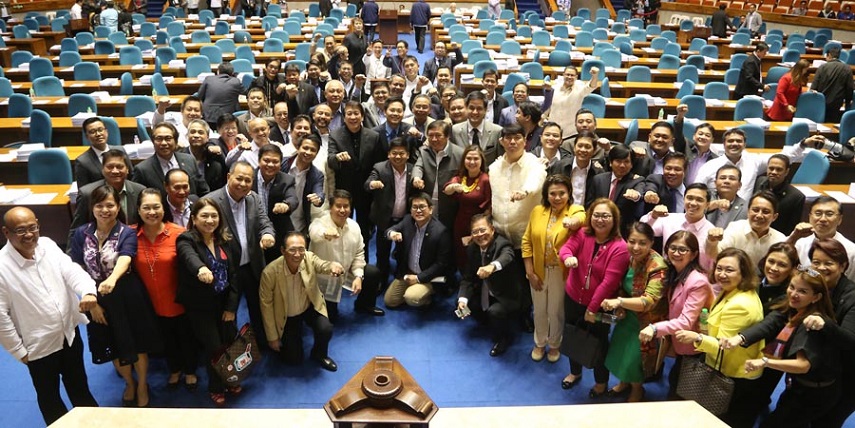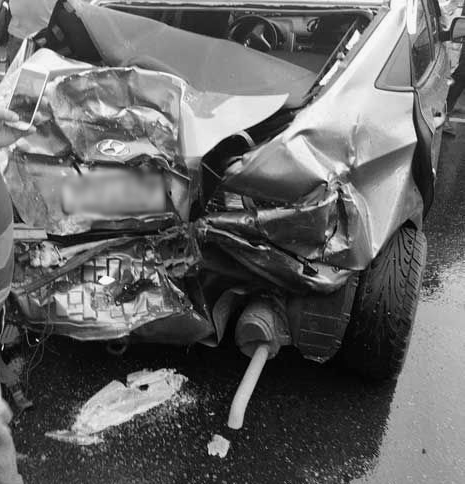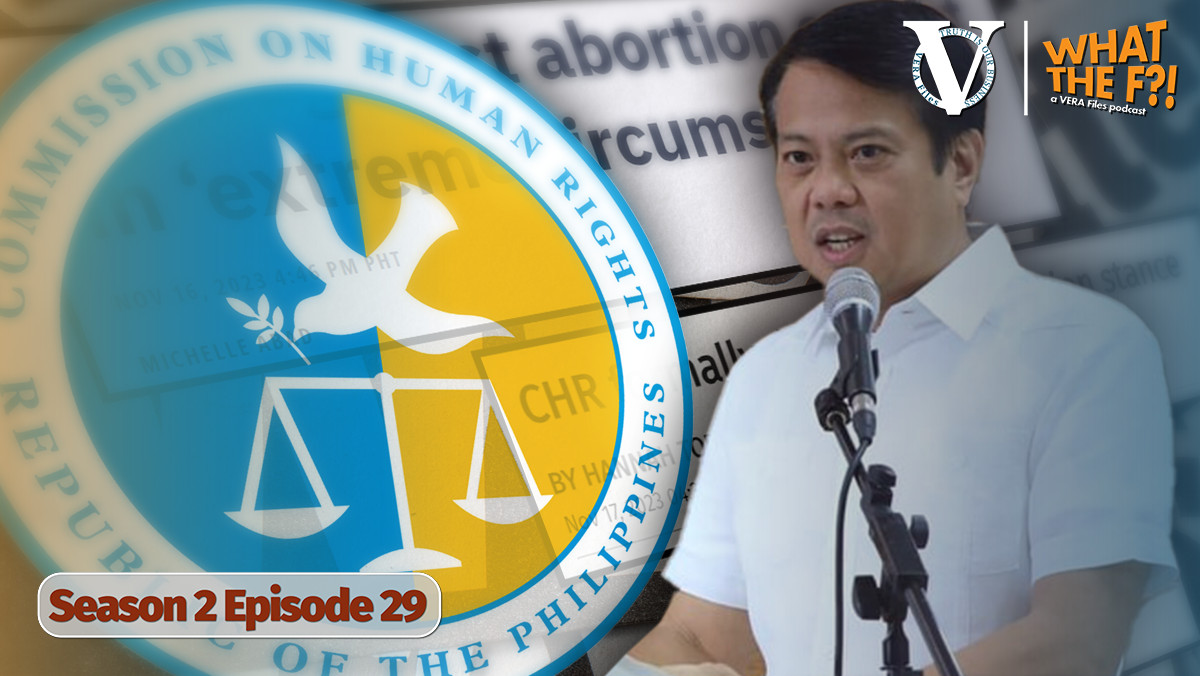
A jubilant majority of the members of the House of Representatives flash the famous clenched fist sign of Pres. Rodrigo Duterte after they approved on second reading House Bill 6215 or the 2018 General Appropriations Bill providing a P3.76 trillion national budget for 2018. They reduced the budget for the Commission on Human Rights to P1, 000. Photo from HOR website.
A vehicle like a boat requires stabilizing mechanisms. A katig (outrigger) serves this purpose. The katig prevents a boat from leaning too much on one or the other side, thus preventing the boat from capsizing. Remove the katig, and the boat may be fine in calm waters. But it will quickly capsize in rough or turbulent waters.
Sometimes, it is not the sea that is turbulent. Occupants of the boat may be involved in a heated argument, or even a fist fight. This will rock the boat, and the boat will capsize even in calm waters if there were no katig.
This is why the 1987 Constitution has added more katigs to the ship of state — the Commission on Human Rights and the Ombudsman in addition to the traditional katigs, which were inadequate to keep stability the last time Marcos hijacked the boat. The traditional ones were the Commission on Audit, the Civil Service Commission, and the Commission on Elections.
The katigs allow the more political, rambunctious occupants of the state to engage in the rough and tumble of politics. This state of affairs is called “democracy.” These are the House of Representatives and its members, the Senate and its members, the President and his cabinet, the mass media, the political elite, and even the hecklers and other troublemakers.
Over the past year, the occupants of this ship of state have been more spirited than usual. They elected a new leader, his supporters fondly call Tatay Digong, who promised to protect the nation. Tatay Digong seemed true to his word, although this is based on his previous captainship of a much smaller boat. Still, he appeared to be swashbuckling on the bigger boat as well.
Senator Leila De Lima, an outspoken critic of Tatay Digong, is confined below the hold (she had been feisty, but was not even inebriated!). Supreme Court Chief Justice Lourdes Sereno had been slapped on the wrist (or face?) by Tatay Digong, the boat captain himself. The Ombudsman, Conchita Morales, was similarly chastised. Is it uncanny that all three are women?
All these skirmishes on board the boat center not on poverty and hunger and the destination of the boat. It is about the “dregs of the boat.” The war on drugs — whether occupants who are found to have a “whiff” of drug use will be summarily thrown overboard as endangering the whole ship. These “dregs” of society have been adjudged by the boat captain as the reason why the ship of state cannot move as fast as it should. They are dragging the boat, and everyone else, down.
This flailing and shouting is already rocking the boat, and is alarming for the rest of the occupants of the boat. Then this petty officer, a certain Pantaleon Alvarez and his cohorts jump onto the railings and are now trying to loosen what is arguably the most critical katig of all — the Commission on Human Rights. The Commission on Human Rights ensures that no matter how rambunctious the proceedings on the ship of state, no person is deprived of life, liberty, freedom, and the pursuit of happiness. That, in fact, is the foundation of the ship of state. If that condition is removed, all the nails, lashings, glues, bindings of the ship will be undone, and everything and everyone on the ship will in due time end up as flotsam on the rough seas.

Pres. Duterte and House Speaker Pantalon Alvarez. Malacañang photo.
Pantaleon Alvarez and his gang formed the House of Representatives that just decided to remove the lashings that attach the katig to the boat (or the boat to the katig). Instead of 496,000 strands, only 1000 strands will hold the boat to the katig. Clearly, this katig will no longer be able to prevent the boat from capsizing when the first big wave that comes along.
It is funny that Pantaleon Alvarez and his gang, sworn to protect the Constitution and elected by the people, are charging this katig — the Commission on Human Rights — for taking the side (“kinakatigan”) of the ordinary people — usually poor, vulnerable, marginalized, disadvantaged, and voiceless — who are being stripped summarily of life, liberty, freedom, and the right to pursue happiness.
The Commission on Human Rights is among the weakest organs of the government. it does not have any enforcement powers. All it has, really, is moral suasion. It is no more than an institutional conscience speaking on behalf of the Filipino people. There is no way the ship of state can be in danger when it speaks of the human rights of even the most dangerous suspected criminals.
Pantaleon Alvarez and his gang have decided to remove the lashings of the katig. Another group of persons, called the Senate, are in half-control of these lashings of the katig. Will they decide to remove these lashings as well?
The boat captain, Tatay Digong, is waiting. He has so far brow-beaten this small group of persons — the Senate — to do his bidding since the start of the voyage. His will has obviously been acted on by Alvarez and his gang.
But all the other occupants of the boat are also waiting. The Senate is their elected representative, and they are wondering, will the Senate unbind the katig, knowing that this is going to be a violation not only of the people’s trust, but a violation of the Constitution itself?
I imagine myself on a boat running alongside this ship of state. I hold my breath waiting for the people on this boat, called the Filipino people and their chosen leaders, take the first step to committing suicide. All I can remember at this moment are the words of an insightful outsider — James Fallows — who, in a flash of insight, 30 years ago, put two words to describe this peculiar people: “Damaged Culture.”
So, will the Filipino people take this path — commit national suicide?
(The author, Dr. Segundo Joaquin E. Romero, Jr. Professorial Lecturer at the Development Studies Program of the Ateneo de Manila University)




